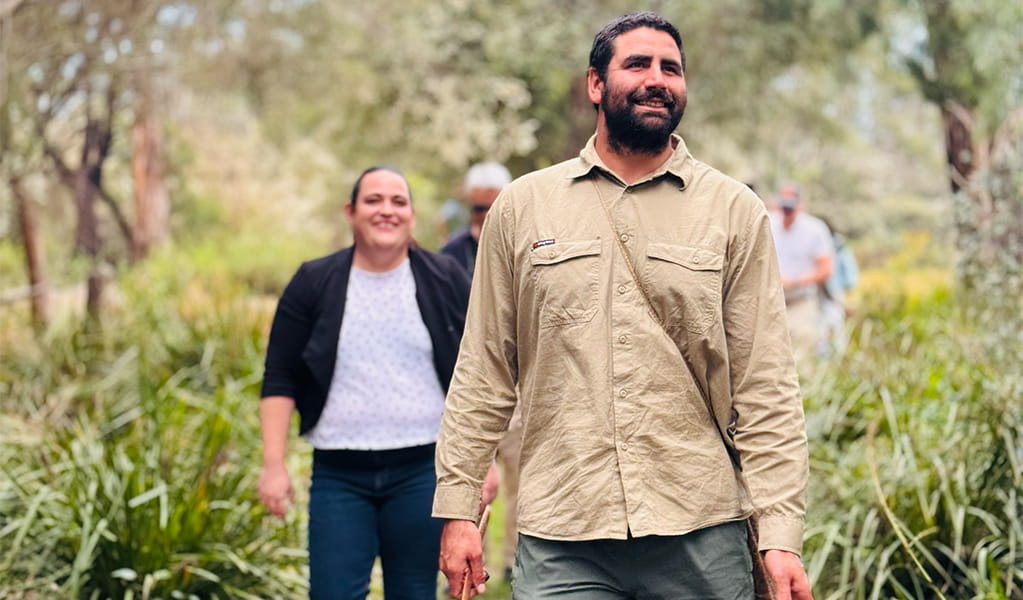Guided Aboriginal cultural tour in Eden
Pambula-Haycock area in Beowa National Park
Overview
Discover the rich culture of the Thaua People on an immersive cultural tour with Eden Local Aboriginal Land Council. You’ll see stunning coastal landscapes in and around Beowa National Park.
- When
- Contact Eden Local Aboriginal Land Council for tour dates.
- Where
- Pambula-Haycock area in Beowa National Park in South Coast
- Accessibility
- No wheelchair access
- Grade
- Easy. A basic level of fitness is required. You’ll be walking on a trail with slight slopes and a few steps.
- Price
- Contact Eden Local Aboriginal Land Council for pricing.
- Entry fees
- Price includes park entry fee
- Meeting point
- The Keeping Place, Jigamy 4381 Princes Highway, Broadwater
- Bookings
- Bookings required. Book online, email or call Eden Local Aboriginal Land Council on 0435 571 566.
- Please note
- This experience includes return vehicle transfers from the Pinnacles to Jigamy.
Explore Thaua Country from Jigamy to the Pinnacles with Eden Local Aboriginal Land Council in Beowa National Park. This small-group tour begins with a traditional smoking ceremony at Jigamy, a centre for local Aboriginal culture. You'll then set off on a 3.8km walk along part of the Bundian Way, an ancient pathway that provided safe passage for Aboriginal people between the coast and the high country. Wander through coastal bushland and see breathtaking ocean vistas before arriving at the Pinnacles, a striking geological formation of white sand and red clay cliffs.
Your friendly guides and custodians of Country will share timeless stories as they lead you through ancient landscapes. You’ll learn about bush foods, cultural practices, and the deep connection between land and people.
By joining this tour, you’re supporting Eden Local Aboriginal Land Council in cultural preservation, intergenerational knowledge sharing, and community empowerment.
Eden Local Aboriginal Land Council is a licensed commercial tour operator with a Parks Eco Pass.
Local alerts
For the latest updates on fires, closures and other alerts in this area, see https://www.nationalparks.nsw.gov.au/things-to-do/guided-tours/guided-aboriginal-cultural-tour-eden/local-alerts
Operated by

Park info
- in the Pambula-Haycock area of Beowa National Park in the South Coast region
The Pambula-Haycock area of Beowa National Park is always open but may have to close at times due to poor weather or fire danger.
Visitor info
All the practical information you need to know about Guided Aboriginal cultural tour in Eden.
Getting there and parking
Get driving directions
Contact Eden Local Aboriginal Land Council for directions.
Parking
Contact Eden Local Aboriginal Land Council for information on parking.
Maps and downloads
Accessibility
Disability access level - no wheelchair access
This tour takes place along a 3.8km walk that includes steps.
Learn more
Guided Aboriginal cultural tour in Eden is in Pambula-Haycock area. Here are just some of the reasons why this park is special:
Aboriginal culture

The Yuin People are the Traditional Owners and Custodians of Beowa National Park and they have a long and complex relationship with the coastal environment. Some of the best preserved mounded middens on the east coast of Australia are found in the park along the Pambula River. These middens contain the shells of oysters, mussels and sometimes the bones of sea and land mammals—collected by Aboriginal people from the rock platforms, reefs and estuaries along the park’s coastline.
- Guided Aboriginal cultural tour in Eden Discover the rich culture of the Thaua People on an immersive cultural tour with Eden Local Aboriginal Land Council. You’ll see stunning coastal landscapes in and around Beowa National Park.
- Severs Beach Severs Beach, in Beowa National Park in the whale watching town of Eden on NSW’s Sapphire Coast, offers Aboriginal heritage, fishing, beach walks and more.
Rocks tell a story

The park’s stunning rock formations, inlets and headlands are the result of extensive geological folding. Most of Beowa National Park lies on red, brown and green shales, sandstones, siltstones and quartzites. These were formed in the Devonian period around 360 million years ago, before dinosaurs roamed the earth. You can see these rock types exposed along the cliffs and headlands. The Devonian period is known as The Age of Fishes and internationally-significant fish fossils have been found in several places along the park’s coastline.
- Haycock Point to Barmouth Beach walking track The walk from Haycock Point to Barmouth Beach in Beowa National Park takes in whale watching, scenic coastal views, wildlife and birdwatching opportunities.
- Pambula River kayaking tour Experience Beowa National Park from the crystal-clear waters of the Pambula River on this exciting guided kayaking tour with Navigate Expeditions.
Refuge for threatened species

Several threatened species take refuge in the Pambula-Haycock area. North of Pambula River there's an important population of yellow-bellied gliders—listen carefully for their trademark crackles and shrieks. Around 50 native mammals and nearly 150 species of birds have been recorded in Beowa National Park. This includes 1 critically endangered bird, 4 endangered animal species and 25 vulnerable species.
- Haycock Point to Barmouth Beach walking track The walk from Haycock Point to Barmouth Beach in Beowa National Park takes in whale watching, scenic coastal views, wildlife and birdwatching opportunities.
- Pambula River kayaking tour Experience Beowa National Park from the crystal-clear waters of the Pambula River on this exciting guided kayaking tour with Navigate Expeditions.
Plants and animals protected in this park
Animals
-

Australian pelican (Pelecanus conspicillatus)
The curious pelican is Australia’s largest flying bird and has the longest bill of any bird in the world. These Australian birds are found throughout Australian waterways and the pelican uses its throat pouch to trawl for fish. Pelicans breed all year round, congregating in large colonies on secluded beaches and islands.
-

Australian fur seal (Arctocephalus pusillus doriferus)
The largest fur seal, Australian fur seals are found in isolated rocky outcrops and islands along the NSW coast. They come ashore to form breeding colonies and can often be seen at Barunguba Montague Island Nature Reserve.

